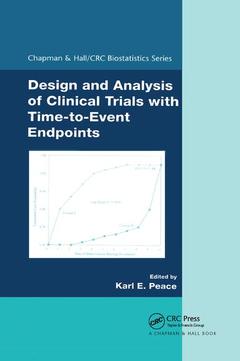Design and Analysis of Clinical Trials with Time-to-Event Endpoints Chapman & Hall/CRC Biostatistics Series
Coordonnateur : Peace Karl E.

Using time-to-event analysis methodology requires careful definition of the event, censored observation, provision of adequate follow-up, number of events, and independence or "noninformativeness" of the censoring mechanisms relative to the event. Design and Analysis of Clinical Trials with Time-to-Event Endpoints provides a thorough presentation of the design, monitoring, analysis, and interpretation of clinical trials in which time-to-event is of critical interest.
After reviewing time-to-event endpoint methodology, clinical trial issues, and the design and monitoring of clinical trials, the book focuses on inferential analysis methods, including parametric, semiparametric, categorical, and Bayesian methods; an alternative to the Cox model for small samples; and estimation and testing for change in hazard. It then presents descriptive and graphical methods useful in the analysis of time-to-event endpoints. The next several chapters explore a variety of clinical trials, from analgesic, antibiotic, and antiviral trials to cardiovascular and cancer prevention, prostate cancer, astrocytoma brain tumor, and chronic myelogonous leukemia trials. The book then covers areas of drug development, medical practice, and safety assessment. It concludes with the design and analysis of clinical trials of animals required by the FDA for new drug applications.
Drawing on the expert contributors? experiences working in biomedical research and clinical drug development, this comprehensive resource covers an array of time-to-event methods and explores an assortment of real-world applications.
Overview of Time-to-Event Endpoint Methodology. Design (and Monitoring) of Clinical Trials with Time-to-Event Endpoints. Overview of Time-to-Event Parametric Methods. Overview of Semiparametric Inferential Methods for Time-to-Event Endpoints. Overview of Inferential Methods for Categorical Time-to-Event Data. Overview of Bayesian Inferential Methods Including Time-to-Event Endpoints. An Efficient Alternative to the Cox Model for Small Time-to-Event Trials. Estimation and Testing for Change in Hazard for Time-to-Event Endpoints. Overview of Descriptive and Graphical Methods for Time-to-Event Data. Design and Analysis of Analgesic Trials. Design and Analysis of Analgesic Trials with Paired Time-to-Event Endpoints. Time-to-Event Endpoint Methods in Antibiotic Trials. Design and Analysis of Cardiovascular Prevention Trials. Design and Analysis of Antiviral Trials. Cure Rate Models with Applications to Melanoma and Prostate Cancer Data. Parametric Likelihoods for Multiple Nonfatal Competing Risks and Death, with Application to Cancer Data. Design, Summarization, Analysis, and Interpretation of Cancer Prevention Trials. LASSO Method in Variable Selection for Right-Censored Time-to-Event Data with Application to Astrocytoma Brain Tumor and Chronic Myelogenous Leukemia. Selecting Optimal Treatments Based on Predictive Factors. Application of Time-to-Event Methods in the Assessment of Safety in Clinical Trials. Design and Analysis of Chronic Carcinogenicity Studies of Pharmaceuticals in Rodents. Design and Analysis of Time-to-Tumor Response in Animal Studies: A Bayesian Perspective. Index.
Karl E. Peace is Georgia Cancer Coalition Distinguished Cancer Scholar (GCCDCS), Senior Research Scientist, and Professor of Biostatistics in the Jiann-Ping Hsu College of Public Health (JPHCOPH) at Georgia Southern University. In addition to his many endowments and awards, Dr. Peace has made critical contributions to the development and approval of drugs to treat Alzheimer’s disease, prevent gastrointestinal ulcers, reduce the risk of myocardial infarction, and treat anxiety/depression.
Date de parution : 09-2018
15.6x23.4 cm
Date de parution : 04-2009
Ouvrage de 616 p.
15.6x23.4 cm
Thème de Design and Analysis of Clinical Trials with... :
Mots-clés :
Interim Analysis; Cox Model; clinical trials; Time Dependent Covariates; parametric method; Cox Proportional Hazards Model; Cure Rate Models; LASSO method; Gamma Frailty Model; Karl E; Peace; Accelerated Failure Time Model; cardiovascular prevention; Proportional Hazards Assumption; biomedical research; Invasive Breast Cancer; Hazard Function; Super Learner; Va Ri; Partial Likelihood; Data Set; Baseline Hazards; Regression Models; Posterior Distribution; HLA Match; Log Hazard Ratio; Proportional Hazards Model; PBMC Assay; PFS Rate; Tied Event Times; Median PFS; Estimated Cure Rates



